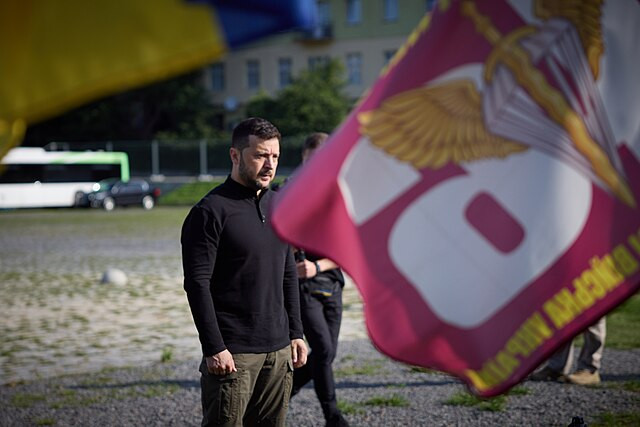Ukraine has officially received F-16 fighter jets, marking a significant milestone in its ongoing conflict with Russia. President Volodymyr Zelensky confirmed the arrival of the US-made aircraft during an emotional address at an undisclosed airbase outside Kyiv on Sunday. This development represents a "new chapter" for the Ukrainian Air Force, as the country bolsters its defenses against Russian aggression.
"F-16s are in Ukraine. We did it. I am proud of our guys who are mastering these jets and have already started using them for our country," Zelensky said, speaking with military pilots flanked by two of the jets, with two more soaring overhead. The President expressed gratitude to the allies who facilitated the transfer, particularly Denmark, the Netherlands, and the United States. "We appreciate your support," he said.
Ukraine has been lobbying for the F-16s since the onset of the war, arguing that they are crucial for protecting its skies from Russian missiles. The F-16s can perform multiple roles, including providing air cover for troops, attacking ground targets, engaging enemy aircraft, and intercepting missiles. Zelensky emphasized that while the current number of F-16s and trained pilots is insufficient, the arrival of the jets is a significant step forward.
The introduction of the F-16s comes as Russia continues to maintain air superiority over Ukraine, conducting long-range missile strikes and supporting its forces with guided bombs. Ukrainian pilots have already started flying the new jets, which are expected to intercept Russian missiles and drones, suppress enemy air defenses, and strike troop positions and ammunition depots.
Des avions de chasse F-16, promis depuis des mois par les pays occidentaux à Kiev, sont arrivés en Ukraine, annonce Volodymyr Zelensky
Images : AFP#ukraine #Occident #EtatsUnis #F16 #f16fighter pic.twitter.com/2ecFAC2PhG — Intellect News 24 (@intellect_news) August 4, 2024
Videos have surfaced showing the F-16s in operation over cities like Lviv and Odesa, defending Ukrainian airspace. The arrival of these jets is seen as a potential game-changer, with military analysts suggesting they could significantly impact the dynamics of the war. Federico Borsari of the Center for European Policy Analysis stated, "They will be able to affect some of the dynamics [of the war]."
However, the Kremlin has downplayed the significance of the F-16s. Kremlin spokesperson Dmitry Peskov remarked that the jets would not be a "magic pill" to alter the course of the conflict. Russia has already offered rewards to its personnel for destroying F-16s, indicating the high stakes involved.
Ukraine has been promised more than 60 F-16s from Belgium, Denmark, the Netherlands, and Norway, along with weapons and ammunition reportedly pledged by the US. To protect the jets from Russian attacks, Ukrainian officers have indicated that some F-16s could be stationed on military bases used by allies abroad.
The acquisition of F-16s marks a departure from Ukraine's reliance on an aging fleet of Soviet-era warplanes, which have been outgunned by Russia's more advanced and larger fleet. The new jets are expected to provide Ukraine with a significant boost in air defense capabilities, enabling it to better protect its skies and support ground operations.
Zelensky highlighted the extensive diplomatic efforts that went into securing the F-16s. "We did a lot for Ukrainian forces to transition to a new aviation standard, the western combat aviation," he said, citing hundreds of meetings and negotiations. The President also noted the need for continued training for Ukrainian pilots and engineers to fully utilize the new aircraft.
Despite the positive development, questions remain about the missiles with which the F-16s are equipped. Longer-range missiles would enhance the jets' battlefield impact, according to military analysts. Zelensky also expressed hope for greater cooperation with NATO countries to intercept Russian missiles launched at Ukraine, indicating ongoing diplomatic efforts to bolster the country's defenses.
"This is another tool, and I want to try it, so that NATO countries can talk to Ukraine about the possibility of a small coalition of neighboring countries shooting down enemy missiles," Zelensky said. "I think this decision is probably difficult for our partners, they are always afraid of excessive escalation but we are fighting that."




